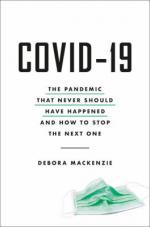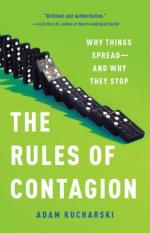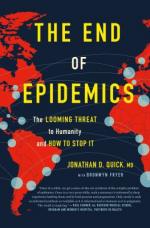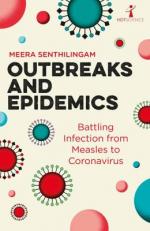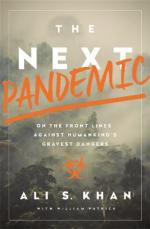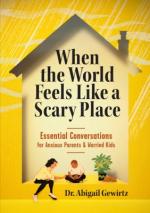September 7, 2020 | sobczakd
The Covid-19 pandemic continues to have an impact on our daily lives. Throughout human history, outbreaks of highly-contagious deadly viruses have taken the lives of millions of people. The most devastating pandemic in recorded history was known as "the Black Death" in which 75-200 million were killed in the early 14th century. In 1918, the Spanish Flu pandemic claimed between 17-50 million lives. The ongoing pandemic of the coronavirus has so far infected over 26.6 million people worldwide with new cases are added every day. No one can predict when we will truly be free of Covid-19. To keep up-to-date with the global health crisis, click on the Covid-19 Tracker link. All we can do is stay safe and stop the spread. Want to learn more? Check out these resources.
Over the last 30 years of epidemics and pandemics, we learned nearly every lesson needed to stop this coronavirus outbreak in its tracks. We heeded almost none of them. The result is a pandemic on a scale never before seen in our lifetimes. In this captivating, authoritative, and eye-opening book, science journalist Debora MacKenzie lays out the full story of how and why it happened: the previous viruses that should have prepared us, the shocking public health failures that paved the way, the failure to contain the outbreak, and most importantly, what we must do to prevent future pandemics. Debora MacKenzie has been reporting on emerging diseases for more than three decades, and she draws on that experience to explain how COVID-19 went from a potentially manageable outbreak to a global pandemic. Offering a compelling history of the most significant recent outbreaks, including SARS, MERS, H1N1, Zika, and Ebola, she gives a crash course in Epidemiology 101--how viruses spread and how pandemics end--and outlines the lessons we failed to learn from each past crisis. In vivid detail, she takes us through the arrival and spread of COVID-19, making clear the steps that governments knew they could have taken to prevent or at least prepare for this. Looking forward, MacKenzie makes a bold, optimistic argument: this pandemic might finally galvanize the world to take viruses seriously. Fighting this pandemic and preventing the next one will take political action of all kinds, globally, from governments, the scientific community, and individuals--but it is possible. No one has yet brought together our knowledge of COVID-19 in a comprehensive, informative, and accessible way. But that story can already be told, and Debora MacKenzie's urgent telling is required reading for these times and beyond. It is too early to say where the COVID-19 pandemic will go, but it is past time to talk about what went wrong and how we can do better.
A deadly virus suddenly explodes into the population. A political movement gathers pace, and then quickly vanishes. An idea takes off like wildfire, changing our world forever. We live in a world that's more interconnected than ever before. Our lives are shaped by outbreaks - of disease, of misinformation, even of violence - that appear, spread and fade away with bewildering speed. To understand them, we need to learn the hidden laws that govern them. From 'superspreaders' who might spark a pandemic or bring down a financial system to the social dynamics that make loneliness catch on, The Rules of Contagion offers compelling insights into human behavior and explains how we can get better at predicting what happens next. Along the way, Adam Kucharski explores how innovations spread through friendship networks, what links computer viruses with folk stories - and why the most useful predictions aren't necessarily the ones that come true.
The 2020 outbreak of coronavirus has terrified the world--and revealed how unprepared we are for the next outbreak of an infectious disease. Somewhere in nature, a killer virus is boiling up in the bloodstream of a bird, bat, monkey, or pig, preparing to jump to a human being. This not-yet-detected germ has the potential to wipe out millions of lives over a matter of weeks or months. That risk makes the threat posed by ISIS, a ground war, a massive climate event, or even the dropping of a nuclear bomb on a major city pale in comparison. In The End of Epidemics, Duke Global Health Institute faculty member and past Chair of the Global Health Council Dr. Jonathan D. Quick examines the eradication of smallpox and devastating effects of influenza, AIDS, SARS, Ebola, and other viral diseases . Analyzing local and global efforts to contain these diseases and citing firsthand accounts of failure and success, Dr. Quick proposes a new set of actions which he has coined "The Power of Seven," to end epidemics before they can begin.
In recent years, outbreaks of Ebola and Zika have provided vivid examples of how difficult it is to contain an infection once it strikes, and the panic that a rapidly spreading epidemic can ignite. But while we chase the diseases we are already aware of, new ones are constantly emerging, like the coronavirus that spread across the world in 2020. At the same time, antimicrobial resistance is harnessing infections that we once knew how to control, enabling them to thrive once more.
Throughout history, humankind's biggest killers have been infectious diseases: the Black Death, the Spanish Flu, and AIDS alone account for over one hundred million deaths. We ignore this reality most of the time, but when a new threat -- Ebola, SARS, Zika, coronavirus -- seems imminent, we send our best and bravest doctors to contain it. People like Dr. Ali S. Khan. In his long career as a public health first responder -- protected by a thin mask from infected patients, napping under nets to keep out scorpions, making life-and-death decisions on limited, suspect information -- Khan has found that rogue microbes will always be a problem, but outbreaks are often caused by people. We make mistakes, politicize emergencies, and, too often, fail to imagine the consequences of our actions. The Next Pandemic is a firsthand account of disasters like anthrax, bird flu, and others -- and how we could do more to prevent their return. It is both a gripping story of our brushes with fate and an urgent lesson on how we can keep ourselves safe from the inevitable next pandemic.
Unlike natural disasters, whose destruction is concentrated in a limited area over a period of days, and illnesses, which have devastating effects but are limited to individuals and their families, infectious disease has the terrifying power to disrupt everyday life on a global scale, overwhelming public and private resources and bringing trade and transportation to a grinding halt. In today's world, it's easier than ever to move people, animals, and materials around the planet, but the same advances that make modern infrastructure so efficient have made epidemics and even pandemics nearly inevitable. And as outbreaks of COVID-19, Ebola, MERS, and Zika have demonstrated, we are woefully underprepared to deal with the fallout. So what can -- and must -- we do in order to protect ourselves from mankind's deadliest enemy? Drawing on the latest medical science, case studies, policy research, and hard-earned epidemiological lessons, Deadliest Enemy explores the resources and programs we need to develop if we are to keep ourselves safe from infectious disease. The authors show how we could wake up to a reality in which many antibiotics no longer cure, bioterror is a certainty, and the threat of a disastrous influenza or coronavirus pandemic looms ever larger. Only by understanding the challenges we face can we prevent the unthinkable from becoming the inevitable.
In a lifesaving guide for parents, Dr. Abigail Gewirtz shows how to use the most basic tool at your disposal--conversation--to give children real help in dealing with the worries, stress, and other negative emotions caused by problems in the world, from active shooter drills to climate change. But it's not just how to talk to your kids, it's also what to say: The heart of When the World Feels Like a Scary Place is a series of conversation scripts--with actual dialogue, talking points, prompts, and insightful asides--that are each age-appropriate and centered around different issues. Along the way are tips about staying calm in an anxious world; the way children react to stress, and how parents can read the signs; and how parents can make sure that their own anxiety doesn't color the conversation. Talking and listening are essential for nurturing resilient, confident, and compassionate children. And conversation will help you manage your anxieties too, offering a path of wholeness and security for everyone in the family.
On December 29, 2019, historian Timothy Snyder fell gravely ill. Unable to stand, barely able to think, he waited for hours in an emergency room before being correctly diagnosed and rushed into surgery. Over the next few days, as he clung to life and the first light of a new year came through his window, he found himself reflecting on the fragility of health, not recognized in America as a human right but without which all rights and freedoms have no meaning. And that was before the pandemic. We have since watched American hospitals, long understaffed and undersupplied, buckling under waves of coronavirus patients. The federal government made matters worse through willful ignorance, misinformation, and profiteering. Our system of commercial medicine failed the ultimate test, and thousands of Americans died.
In this eye-opening cri de coeur, Snyder traces the societal forces that led us here and outlines the lessons we must learn to survive. In examining some of the darkest moments of recent history and of his own life, Snyder finds glimmers of hope and principles that could lead us out of our current malaise. Only by enshrining healthcare as a human right, elevating the authority of doctors and medical knowledge, and planning for our children's future can we create an America where everyone is truly free.
The Center for Disease Control and Prevention in the US and the World Health Organization have declared the coronavirus a worldwide health emergency. The coronavirus was first identified in Wuhan, China. Now, from the medical experts there, comes the first authoritative, comprehensive guide to preparing for the ongoing epidemic (COVID-19). Written in plain language, here is information that will help readers and professionals understand the virus and protect themselves in the face of a possible outbreak. As COVID-19 continues to spread around the world--China, South Korea, Iran, Italy, Germany, the United Kingdom, Canada, and the United States--preventative measures such as controlling the source of infection, early detection of patients, and cutting off transmission are imperative.
